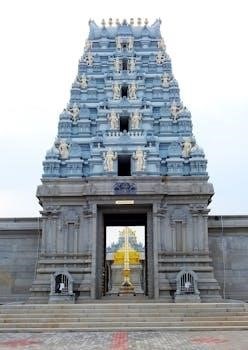The Sri Venkateswara Stotram is a sacred hymn dedicated to Lord Venkateswara, also known as Tirupati Balaji․ It is a prayer praising the deity’s virtues, beauty, and seeking protection and blessings․
Significance of Venkateswara Stotram
The Venkateswara Stotram holds immense significance for devotees seeking divine grace․ Reciting these verses is believed to invoke Lord Venkateswara’s blessings, offering protection and spiritual upliftment․ The Stotram’s power lies in its ability to connect devotees with the divine, fostering devotion and inner peace․ It serves as a pathway to experiencing the Lord’s presence, fulfilling desires, and leading toward enlightenment․ The verses describe the glory and virtues of God Vishnu in the Venkateswara Swamy form․ It is a means of expressing reverence and seeking solace in the divine embrace․
Sri Venkateswara⁚ The Deity
Sri Venkateswara, also known as Tirupati Balaji, is a revered form of Lord Vishnu․ He is the presiding deity of the Tirumala Venkateswara Temple in Andhra Pradesh, India․
Forms and Names of Lord Venkateswara
Lord Venkateswara is known by many names, each reflecting a different aspect of his divine persona․ Some popular names include Venkanna, Balaji, Srinivasa, and Govinda․ He is also known as Venkata Ramana, Venkatachalapati, and Yedukondalavadu, referring to his abode on the seven hills․ Devotees also call him Tirupati Timmappa and Perumal․ These names reflect his accessibility and the deep devotion he inspires․ The diverse names highlight the multifaceted nature of the deity and the rich tapestry of faith surrounding him․ Each name carries a special significance․

Venkateswara Stotram⁚ Lyrics and Meaning
The Venkateswara Stotram consists of powerful verses that describe the glory of Lord Vishnu in the form of Venkateswara Swamy․ These lyrics seek his blessings and protection․
Importance of the Stotram’s Verses
The verses of the Venkateswara Stotram hold immense significance as they directly address Lord Venkateswara, praising his divine attributes and seeking his grace․ Each line resonates with devotion, painting a vivid picture of the Lord’s beauty and power․ Reciting these verses is believed to invoke blessings, offering solace and protection to devotees․ The stotram’s verses are structured to highlight the virtues of God Vishnu, therefore fostering a deeper connection with the divine․ The stotram acts as a medium to express reverence and surrender․
Languages and Scripts
The Sri Venkateswara Stotram is available in various languages and scripts, including Telugu․ This allows devotees to connect with the prayer in their preferred language․
Availability in Telugu Script (PDF)
Devotees seeking to recite or study the Sri Venkateswara Stotram in its original form can find it readily available in Telugu script․ Many websites and online resources offer the Stotram in PDF format, enabling easy access and download for personal use․ This digital availability ensures that the sacred verses are preserved and accessible to a wide audience familiar with the Telugu language, fostering a deeper connection with the divine through the authentic script․ The PDF format also allows for convenient printing and sharing of the Stotram․

Vaidika Vignanam and Other Resources
Vaidika Vignanam provides a collection of spiritual literature in various languages, including Telugu, where the Venkateswara Stotram can be found, offering devotees a valuable resource․
Online Availability of the Stotram
The Sri Venkateswara Stotram is readily available online across various platforms․ Devotees seeking to connect with Lord Venkateswara can easily access the Stotram in Telugu script, often in PDF format, through websites like Vaidika Vignanam․ These resources offer convenience for recitation and understanding of the hymn’s sacred verses․ Furthermore, numerous websites and apps dedicated to Hindu devotional literature provide access to the Stotram, enhancing its accessibility for devotees worldwide; This online availability ensures the Stotram’s continued reach and preservation for future generations․

Authorship and Composition
The authorship of the Sri Venkateswara Stotram is attributed to various sources․ Tallapaka Annamacharya, a poet and devotee, contributed significantly to Venkateswara’s praise through his devotional songs and hymns․
Tallapaka Annamacharya’s Contribution
Tallapaka Annamacharya, a 14th-century Telugu poet-saint, was a profound devotee of Lord Venkateswara․ He composed numerous devotional songs, known as sankirtanas, in praise of the deity․ These compositions are integral to the Sri Venkateswara tradition, enriching the spiritual landscape with heartfelt expressions of devotion․ Annamacharya’s sankirtanas celebrate Venkateswara’s glory, beauty, and divine attributes․ His contributions solidified the deity’s prominence in Telugu culture, inspiring countless devotees through his poetic expressions of love and surrender․ His works remain a treasure trove of spiritual wisdom․
Benefits of Reciting the Stotram
Reciting the Sri Venkateswara Stotram brings blessings, protection, and spiritual growth․ It fosters devotion, reduces negativity, and helps attain inner peace, connecting devotees with divine grace․
Seeking Blessings and Protection
Devotees recite the Sri Venkateswara Stotram with the intention of seeking divine blessings and protection from Lord Venkateswara․ The hymn’s verses describe the Lord’s lotus eyes, conch shell, and discus, invoking his power․ Through sincere recitation, individuals aim to connect with Venkateswara’s divine qualities․ The stotram serves as a means to request the Lord’s grace, hoping for wellbeing, prosperity, and spiritual advancement․ It praises Venkateswara’s virtues․ Seeking refuge and guidance, devotees believe the Stotram offers solace, strength, and shields them from life’s adversities․ It is a path to connect․

Related Prayers and Hymns
Associated with the Sri Venkateswara Stotram are other significant prayers like the Venkateswara Suprabhatam, which is a morning hymn․ Additionally, the Venkateswara Sahasranama Stotram lists the 1000 names of the deity․
Venkateswara Suprabhatam
The Venkateswara Suprabhatam comprises a collection of hymns recited to awaken Lord Venkateswara each morning․ It consists of the Suprabhatam (29 verses), Stotram (11 verses), Prapatti (14 verses), and Mangalasasanam (16 verses)․ These verses describe the glory of the Lord and offer salutations․ The Suprabhatam is a popular and widely recited prayer in temples and homes․ It is considered auspicious to listen to or recite the Suprabhatam․ It sets a positive tone for the day and invokes the blessings of Lord Venkateswara․
Venkateswara Sahasranama Stotram
The Venkateswara Sahasranama Stotram is a sacred hymn that lists one thousand names of Lord Venkateswara, each name representing a different aspect or quality of the deity․ Reciting or listening to the Sahasranama Stotram is believed to be highly auspicious․ It is said to bestow spiritual merit, remove obstacles, and fulfill desires; The Sahasranama Stotram is available in various languages, including Telugu․ Devotees often chant it during special occasions or as a part of their daily prayers to connect with Lord Venkateswara․
Availability of Books
Devotees seeking a physical copy can find the Sri Venkateshwara Stotranidhi in Telugu, available for purchase online․ This book contains stotras and other devotional literature․
Sri Venkateshwara Stotranidhi (Telugu)
The ‘Sri Venkateshwara Stotranidhi’ is a Telugu book containing a collection of stotras dedicated to Lord Venkateswara․ This book is available for purchase and offers devotees a tangible way to connect with the divine․ Readers can find the book online․ It includes the Venkateswara Stotram and other prayers․ This book allows devotees to easily access and recite the sacred hymns in Telugu, deepening their devotion and seeking the blessings of Lord Venkateswara․ The book provides a comprehensive compilation of devotional material․
Other Stotras and Deities
Besides the Venkateswara Stotram, devotees often recite other stotras like the Lakshmi Stotram․ Additionally, prayers dedicated to deities such as Ayyappa are also common in devotional practices․
Lakshmi Stotram
The Lakshmi Stotram is a revered hymn dedicated to Goddess Lakshmi, the Hindu deity of wealth, prosperity, and fortune․ Reciting the Lakshmi Stotram is believed to invoke her blessings for abundance and well-being․ Like the Venkateswara Stotram, it is available in various languages, including Telugu․ Devotees often chant this stotra alongside prayers to Lord Venkateswara, seeking overall prosperity for their families and themselves․ The Lakshmi Stotram holds a significant place in Hindu devotional practices and is frequently recited during festivals and auspicious occasions to honor the divine goddess․
Ayyappa Stotram
The Ayyappa Stotram is a devotional hymn dedicated to Lord Ayyappa, a popular deity worshipped in South India, particularly in Kerala․ The stotram praises Lord Ayyappa’s divine qualities and seeks his blessings for spiritual growth and protection․ Similar to the Sri Venkateswara Stotram, the Ayyappa Stotram is available in various languages, including Telugu, catering to the diverse linguistic preferences of devotees․ Reciting the Ayyappa Stotram is considered highly auspicious, especially during the Mandala and Makaravilakku seasons, when devotees undertake pilgrimages to Sabarimala to honor the deity and seek his divine grace․